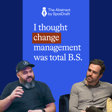
Ep 98: Breaking the Silence: Legal Leaders Talk Mental Health
May is Mental Health Awareness Month, so we’ve pulled together some of the most vital stories from some of the star legal and business experts we’ve featured on The Abstract about managing stress, achieving a healthy work/life balance, dealing with tragedies at home, leaving toxic working environments and more. Keep listening and feel inspired to make a positive change in your life and career.
Read detailed summary: https://www.spotdraft.com/podcast/episode-98
Topics
Introduction: 0:00
Ryan Nier, General Counsel at Nova Credit on imposter syndrome and feeling like an outsider in the legal community: 0:43
Joe Sullivan, ex-Chief Security Officer at Uber, Facebook, and Cloudflare on managing the stress of a federal indictment: 6:49
Lawtrades Co-Founders Raad Ahmed and Ashish Walia on how to support your business partner during difficult times: 11:36
Dan Haley, General Counsel and Corporate Secretary at Guild, on balancing work and life after a cancer diagnosis: 14:07
Zoe McMahon, Head of Legal Ops at HP, on mindfulness and bringing parts of your private self into the workplace: 16:47
Laura Frederick, CEO of How to Contract on the importance of seeing a therapist: 18:59
Connect with us:
Tyler Finn - https://www.linkedin.com/in/tylerhfinn
SpotDraft - https://www.linkedin.com/company/spotdraft
SpotDraft is a leading contract lifecycle management platform that solves your end-to-end contract management issues.
Visit https://www.spotdraft.com to learn more.



















